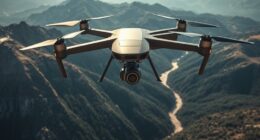Nations are fiercely competing to lead in AI by prioritizing economic gains, military advantage, and technological prestige. They develop AI for cybersecurity, autonomous weapons, and data analysis, often rushing ahead without clear regulations. This rivalry risks unchecked escalation, ethical dilemmas, and global instability. International cooperation is vital, but geopolitical tensions hinder progress. To understand how this high-stakes race unfolds and the potential impacts, keep exploring what drives these powerful nations.
Key Takeaways
- Nations pursue AI development for economic, military, and technological dominance, fueling intense global competition.
- Divergent regulatory approaches hinder international cooperation, increasing risks of unsafe or unethical AI deployment.
- Countries invest heavily in autonomous weapons, cybersecurity, and data analytics to outperform rivals.
- Ethical concerns, such as privacy, bias, and accountability, are often overlooked amid the race for technological edge.
- The AI arms race risks escalating geopolitical tensions and destabilizing global trust if unchecked.

As nations race to dominate artificial intelligence technology, the AI arms race has intensified, prompting concerns over global stability and ethical boundaries. You might wonder how countries are competing so fiercely, but the core drivers are economic advantage, military superiority, and technological prestige. Each nation aims to develop cutting-edge AI systems that can outperform others in areas like cybersecurity, autonomous weapons, and data analytics. However, this rapid advancement raises critical questions about AI regulation and ethical considerations, which are often overlooked amid the race to be first. You should also consider how AI in Business is influencing this competition, as economic factors heavily motivate nations to lead in AI innovation. You need to understand that AI regulation is a complex challenge. Governments recognize the need for frameworks to prevent misuse, ensure safety, and manage the risks of autonomous systems. But many are caught in a dilemma: how do you set effective rules without stifling innovation? Some nations push for strict regulations, emphasizing safety and human rights, while others prioritize rapid deployment to stay ahead. This divergence fuels the competition, making international consensus difficult. Without unified standards, there’s a risk of a regulatory gap that could lead to unsafe AI applications or escalation in the arms race. Moreover, international cooperation is often hindered by geopolitical tensions, complicating efforts to establish global standards for AI development. Recognizing the importance of international collaboration can help mitigate some risks associated with the arms race, but geopolitical rivalries often impede such efforts. Ethical considerations are equally critical, yet often sidelined in the rush to develop powerful AI. You might be concerned about how these technologies impact privacy, decision-making, and human rights. As countries develop more autonomous systems, the potential for misuse or unintended consequences grows. For example, AI-driven military applications could lead to autonomous weapons that make life-and-death decisions without human oversight. This raises profound moral questions about accountability and the value of human judgment in warfare and governance. Nations are also concerned about the bias embedded in AI algorithms, which can reinforce inequalities or lead to unfair treatment if not properly addressed. The competition fuels a cycle where safety and ethics sometimes take a backseat to technological breakthroughs. Countries often prioritize demonstrating their capabilities rather than ensuring their systems adhere to ethical standards. This approach risks creating AI systems that are powerful but unsafe or unregulated. The global community faces the challenge of fostering cooperation—developing international norms and agreements that promote responsible AI development without hindering progress. Ultimately, the stakes are high: unchecked, the AI arms race could destabilize geopolitical relationships, undermine trust, and lead to dangerous escalation.
Frequently Asked Questions
How Does AI Development Impact Global Economic Inequality?
You might see AI development widening economic disparity because advanced AI benefits wealthy nations more, creating a technological divide. This can leave poorer countries behind, limiting their access to new opportunities and worsening inequality. As AI continues to evolve, you could find that those with resources to develop and adopt AI gain a competitive edge, deepening the global economic gap and making it harder for some to catch up.
What Are the Ethical Concerns in AI Weaponization?
Think of AI weaponization as a double-edged sword slicing through peace. You should consider autonomous ethics and weaponized morality, which raise serious concerns. As machines make life-or-death decisions, you risk losing human oversight and accountability. This shift challenges moral boundaries, risking unintended consequences and escalating conflicts. It’s essential to ask: who holds moral authority in these autonomous systems? Without careful control, AI could turn into an unmanageable force.
Which Country Leads in AI Research Publications?
You might notice that the United States leads in AI research publications, showcasing its AI research dominance. This is often reflected through publication metrics, which highlight the volume and impact of research output. As a researcher or policy maker, understanding this helps you gauge which country is at the forefront of AI innovation. Staying informed about these metrics allows you to better assess global AI advancements and strategic priorities.
How Do International Regulations Influence AI Competition?
You might think international regulations curb AI innovation, but they actually spice up the competition. International treaties and regulatory frameworks set the stage, making nations work harder to outsmart each other while staying within rules. Instead of slowing down progress, these rules push countries to innovate smarter, creating a high-stakes game where compliance becomes a strategic move. Ironically, regulation fuels the very race it aims to slow.
What Role Do Private Corporations Play in National AI Strategies?
You should recognize that private corporations play a crucial role in national AI strategies through corporate innovation and strategic partnerships. They develop cutting-edge technologies, often collaborating with governments to shape policies and advance AI capabilities. By leveraging their resources and expertise, these companies help nations stay competitive, foster economic growth, and address ethical concerns. Your understanding of their contributions highlights how public-private collaborations drive progress in AI development.
Conclusion
As you watch this race unfold, remember it’s like a high-stakes chess game with the world as the board. Each nation moves quickly, driven by the promise of power and innovation. But beware—this pursuit of AI dominance could turn into a double-edged sword, cutting both ways. Staying informed and vigilant is your best move, for in this game of shadows, the future’s shape depends on who plays their cards right.









